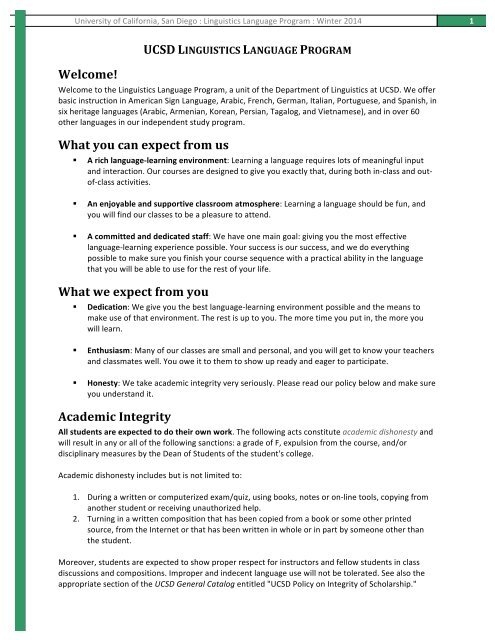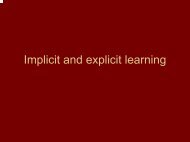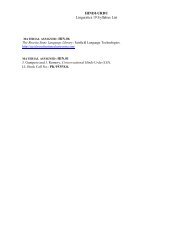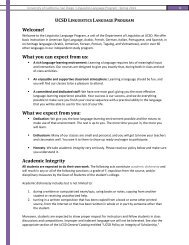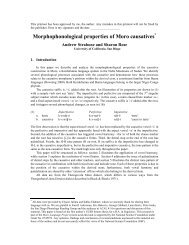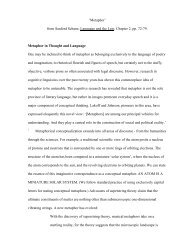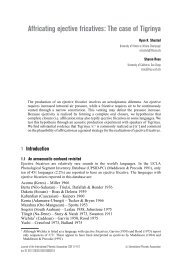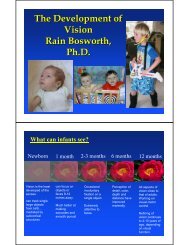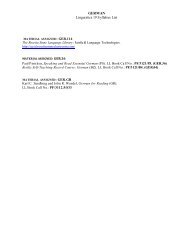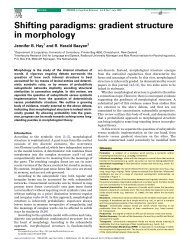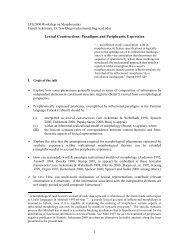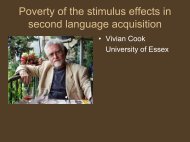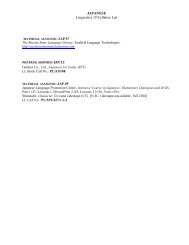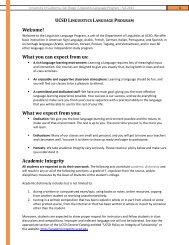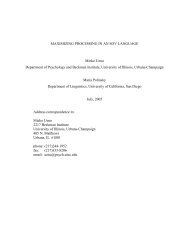1B/BX - Linguistics
1B/BX - Linguistics
1B/BX - Linguistics
You also want an ePaper? Increase the reach of your titles
YUMPU automatically turns print PDFs into web optimized ePapers that Google loves.
University of California, San Diego : <strong>Linguistics</strong> Language Program : Winter 2014 1 . <br />
Welcome! <br />
UCSD LINGUISTICS LANGUAGE PROGRAM <br />
Welcome to the <strong>Linguistics</strong> Language Program, a unit of the Department of <strong>Linguistics</strong> at UCSD. We offer <br />
basic instruction in American Sign Language, Arabic, French, German, Italian, Portuguese, and Spanish, in <br />
six heritage languages (Arabic, Armenian, Korean, Persian, Tagalog, and Vietnamese), and in over 60 <br />
other languages in our independent study program. <br />
What you can expect from us <br />
! A rich language-‐learning environment: Learning a language requires lots of meaningful input <br />
and interaction. Our courses are designed to give you exactly that, during both in-‐class and out-of-‐class<br />
activities. <br />
! An enjoyable and supportive classroom atmosphere: Learning a language should be fun, and <br />
you will find our classes to be a pleasure to attend. <br />
! A committed and dedicated staff: We have one main goal: giving you the most effective <br />
language-‐learning experience possible. Your success is our success, and we do everything <br />
possible to make sure you finish your course sequence with a practical ability in the language <br />
that you will be able to use for the rest of your life. <br />
What we expect from you <br />
! Dedication: We give you the best language-‐learning environment possible and the means to <br />
make use of that environment. The rest is up to you. The more time you put in, the more you <br />
will learn. <br />
! Enthusiasm: Many of our classes are small and personal, and you will get to know your teachers <br />
and classmates well. You owe it to them to show up ready and eager to participate. <br />
! Honesty: We take academic integrity very seriously. Please read our policy below and make sure <br />
you understand it. <br />
Academic Integrity <br />
All students are expected to do their own work. The following acts constitute academic dishonesty and <br />
will result in any or all of the following sanctions: a grade of F, expulsion from the course, and/or <br />
disciplinary measures by the Dean of Students of the student's college. <br />
Academic dishonesty includes but is not limited to: <br />
1. During a written or computerized exam/quiz, using books, notes or on-‐line tools, copying from <br />
another student or receiving unauthorized help. <br />
2. Turning in a written composition that has been copied from a book or some other printed <br />
source, from the Internet or that has been written in whole or in part by someone other than <br />
the student. <br />
Moreover, students are expected to show proper respect for instructors and fellow students in class <br />
discussions and compositions. Improper and indecent language use will not be tolerated. See also the <br />
appropriate section of the UCSD General Catalog entitled "UCSD Policy on Integrity of Scholarship."
University of California, San Diego : <strong>Linguistics</strong> Language Program : Winter 2014 2 . <br />
Course goals <br />
The Conversation and Grammar sections are two halves of one course and need to be taken together. <br />
Both are designed to immerse you in the language and give you a practical ability as quickly as possible. <br />
The two halves are together worth 5 units, so you should expect a heavier workload than a typical 4-‐unit <br />
class. <br />
! Conversation (MWF) is a smaller class, with special attention to vocabulary development and <br />
cultural knowledge. The teacher is known as a Tutor. <br />
! Analysis (TuTh) is a larger class, with special attention to listening, reading, and learning how to <br />
analyze the language and the culture. The teacher is known as a GA. <br />
Attendance <br />
A maximum of three absences in the Conversation classes and two absences in the Analysis section will <br />
be tolerated. Each further absence in a section will lower by one level your grade in that section. For <br />
example, one additional absence will lower a B+ to a B or a C to a C-‐. If you miss 2 weeks or more of class <br />
for any reason, you are encouraged to drop the course; otherwise, you are at risk of failing. <br />
If you are absent and miss a quiz or an exam, see your Tutor or GA immediately to determine if the work <br />
can be made up. An approved make-‐up must be completed within one week. A missed quiz or exam <br />
may be made up at the discretion of the instructor, but the absence cannot be made up. <br />
Enrollment and Placement <br />
If you have had any previous experience in the language you intend to study in our program, (such as <br />
previous course work in high school or college, exposure at home, or residence or study abroad), you <br />
are required to take the Language Placement Exam at our web site at https://lang.ucsd.edu/llp so that <br />
we can place you in a course at the appropriate level. You may already have taken the Language <br />
Placement Exam with the Math and Chemistry Placement Exams. Should you have any questions about <br />
placement, please see the staff in the Language Office, AP&M room 3016. <br />
A student who fails one half of the course must retake that half before continuing on to the next level of <br />
the sequence. In order to enroll in the next level, you must have completed the Conversation <br />
component of the course of the previous level with a grade of "C-‐" or better and the Analysis <br />
component of the course of the previous level with a grade of "D" or better. A student who receives a <br />
Conversation component grade of "C-‐" or better but who receives a "D" in the Analysis component may <br />
do one of two things: Either 1) retake the Analysis component before going on to the next level, or 2) go <br />
on to the next level. However, a student may not complete the next level and subsequently retake a "D" <br />
grade. (A student who receives a "P" grade in the Conversation component and "NP" in the Analysis <br />
component may not continue to the next level.) <br />
Other useful information <br />
LLP web site: http://ling.ucsd.edu/Language/llp.htm <br />
Happy language learning! <br />
Grant Goodall <br />
Professor of <strong>Linguistics</strong> <br />
Director, <strong>Linguistics</strong> Language Program
University of California, San Diego : <strong>Linguistics</strong> Language Program : Winter 2014 3 . <br />
Materials <br />
Spanish <strong>1B</strong>/<strong>1B</strong>X <br />
! Textbook: Terrell et al., Dos Mundos, 7th Edition <br />
! Workbook: Terrell et al., Cuaderno de actividades. Dos Mundos, 7th Edition <br />
! Audio: CD to accompany Dos Mundos, also accesible at the Dos Mundos site <br />
http://highered.mcgraw-‐hill.com/sites/0073385212/student_view0/index.html <br />
! Worksheets: accessible from the LLP website at https://lang.ucsd.edu/llp/ with your UCSD <br />
username and password. You will need to print them and bring them to class. <br />
Grading <br />
! Conversation: 35% Conversation final <br />
20% Class participation <br />
45% Compositions, reading and vocabulary quizzes <br />
NOTE: If you receive a D or F on the conversation final, this will be your <br />
grade for Conversation, regardless of your scores in other components <br />
of the course. <br />
! Analysis: 40% Final exam <br />
20% Midterm I <br />
20% Midterm II <br />
20% Homework, participation and culture homework
University of California, San Diego : <strong>Linguistics</strong> Language Program : Winter 2014 4 . <br />
Schedule <br />
Conversation <strong>1B</strong> (M-‐W-‐F) <br />
Week <br />
Textbook <br />
Vocabulary <br />
Quiz (M) <br />
Reading Assignments (F) <br />
Writing (F) <br />
0, 1 Review, Ch. 1-‐5 <br />
2 Ch. 6 " Las mascotas p. 228 <br />
3* Ch. 6-‐7 " <br />
4 Ch. 7 " <br />
Las hermosas ciudades hispanas <br />
pp. 232-‐233 <br />
(quiz) <br />
La independencia de Sudamérica <br />
p. 257 <br />
5 Review, Ch. 8 " La Diablada de Oruro p.254 <br />
6 Ch. 8 " <br />
7* Ch. 9 " <br />
8 Ch. 9-‐10 " <br />
" <br />
" <br />
(graded) <br />
Machu Picchu: Un viaje por el <br />
tiempo pp. 259-‐260 <br />
(quiz) <br />
Comidas y palabras p. 280 <br />
¡Estoy como agua para chocolate! <br />
p. 287 <br />
Los deliciosos platos andinos <br />
p.293 " <br />
9 Ch. 10 " <br />
10 Review <br />
Los chicos de la calle p. 324 <br />
(quiz) <br />
" <br />
(graded) <br />
*Note: No class on Monday, January 20th and February 17th
University of California, San Diego : <strong>Linguistics</strong> Language Program : Winter 2014 5 . <br />
Details <br />
Conversation <strong>1B</strong> (M-‐W-‐F) <br />
! Vocabulary: You are responsible for learning both the vocabulary introduced in class and in the <br />
textbooks. Your notebook and the vocabulary lists at the end of the chapter will be the basis for <br />
weekly vocabulary quizzes. Each vocabulary quiz consists of five words. <br />
! Reading: The purpose of the assignments is to increase your ability to read narration in Spanish <br />
WITHOUT translating to English, and to participate in class discussion. You can find the readings <br />
in the textbook. <br />
! Writing: There will be several writing exercises; some will be graded. <br />
! Conversation final: An individual 15 minute conversation with your Tutor (which may be taped). <br />
Sign up in class in week 10 for an appointment during finals week. The final cannot be taken <br />
earlier. Your Tutor will judge the conversation final for comprehension, content, vocabulary, <br />
fluency, grammar, and pronunciation.
University of California, San Diego : <strong>Linguistics</strong> Language Program : Winter 2014 6 . <br />
Schedule <br />
Analysis <strong>1B</strong>X (Tu-‐Th) <br />
Week <br />
1 <br />
2 <br />
3 <br />
4 <br />
5 <br />
6 <br />
7 <br />
8 <br />
9 <br />
Material <br />
Review: presente de indicativo, <br />
verbos reflexivos, gustar y <br />
ser/estar <br />
Pretérito (6.3, 7.3), y <br />
comparaciones (6.1, 6.2) <br />
Linguistic Topic: Learning Rules <br />
Pretérito de verbos irregulares <br />
(7.2, 7.3, 7.5), pronombres objeto <br />
indirecto (6.5) <br />
Review <br />
conocer/saber (5.1), pronombres <br />
de objeto directo (6.4, 8.1) <br />
‘se’ impersonal (8.4) y expresiones <br />
como algo/nada (8.3), adjetivos <br />
posesivos (C.2)<br />
Verbos como gustar (8.3), <br />
imperfecto (9.3), verbos irregulars <br />
en pretérito (8.5) <br />
Verbos de estado en pretérito e <br />
imperfecto (9.4), Usos del <br />
pretérito e imperfecto en la <br />
narración <br />
Review <br />
Verbos recíprocos y reflexivos <br />
(9.1), Preposiciones y pronombres <br />
(9.2) <br />
iba+a+inf (9.5) presente perfecto <br />
(10.1), verbos como gustar (10.5), <br />
por y para (10.3) <br />
Homework <br />
Cuaderno de <br />
Actividades <br />
" <br />
<strong>Linguistics</strong> Topic: <br />
Learning Rules <br />
Midterms <br />
Culture <br />
Homework <br />
" " <br />
" <br />
" <br />
W, Th, F <br />
" " <br />
" <br />
" <br />
W, Th, F <br />
" " <br />
10 Final Review
University of California, San Diego : <strong>Linguistics</strong> Language Program : Winter 2014 7 . <br />
Details <br />
Analysis <strong>1B</strong>X (Tu-‐Th) <br />
! Worksheets: Downloadable from the LLP site https://lang.ucsd.edu/llp, they are the main text <br />
for this course. You should also use the grammar explanations in the book to supplement what <br />
you learn in class. Remember, if you do not bring your worksheets to class you cannot be part of <br />
the class discussion and your participation grade will be affected. <br />
! Special information about midterm exams: You will be taking 2 midterm exams in the Language <br />
Laboratory in AP&M 3432. Your GA will inform you of the possible exam dates for your section. <br />
To sign up for a midterm, go to https://lang.ucsd.edu/llp and click on ‘Take a language midterm’. <br />
The exam will take 45 minutes. You will be required to show a picture ID to the lab personnel <br />
and you will need to input at the computer both UCSD username and password and select <br />
Spanish and your level. <br />
! IMPORTANT: The computerized midterms are official exams. You will be held to the same <br />
standards of academic honesty as with an in-‐class exam. When taking the exam you may not use <br />
books, notes, on-‐line resources, or consult with anyone else. You may take the exam only once. <br />
Do not try to restart an exam and do not abandon your workstation part way through; if you do <br />
you will be automatically graded on the work performed up to that point. Midterms cannot be <br />
made up. <br />
! Homework: Your GA will assign some exercises from Cuaderno de Actividades as homework. <br />
When completing your homework, you need to correct your answers with the workbook key <br />
using a different color pen. You won’t receive full credit for your homework if you miss this <br />
important step. No late homework will be accepted. Please remember that the same standards <br />
of academic integrity hold for both tests and homework. <br />
! Culture homework: During the quarter you will have a chance to surf the web for information in <br />
Spanish to complete three different cultural assignments. You must be prepared to share it with <br />
the class. <br />
! Final exam: The final exam is a multiple choice paper and pencil test. The exam contains three <br />
different sections: reading comprehension with grammar questions, listening comprehension <br />
section and class content (culture and linguistic topics). For hours and location of your final, <br />
please check Tritonlink. <br />
! Computerized grammar quizzes: are optional and will not be graded. The quizzes can be taken <br />
either in the Language Laboratory (AP&M 3432) or from any computer with access to the <br />
Internet at https://lang.ucsd.edu/llp. If you need more practice, go on the Dos Mundos site at <br />
http://highered.mcgraw-‐hill.com/sites/0073385212/student_view0/. These practice quizzes <br />
match grammar points covered in your textbook.


